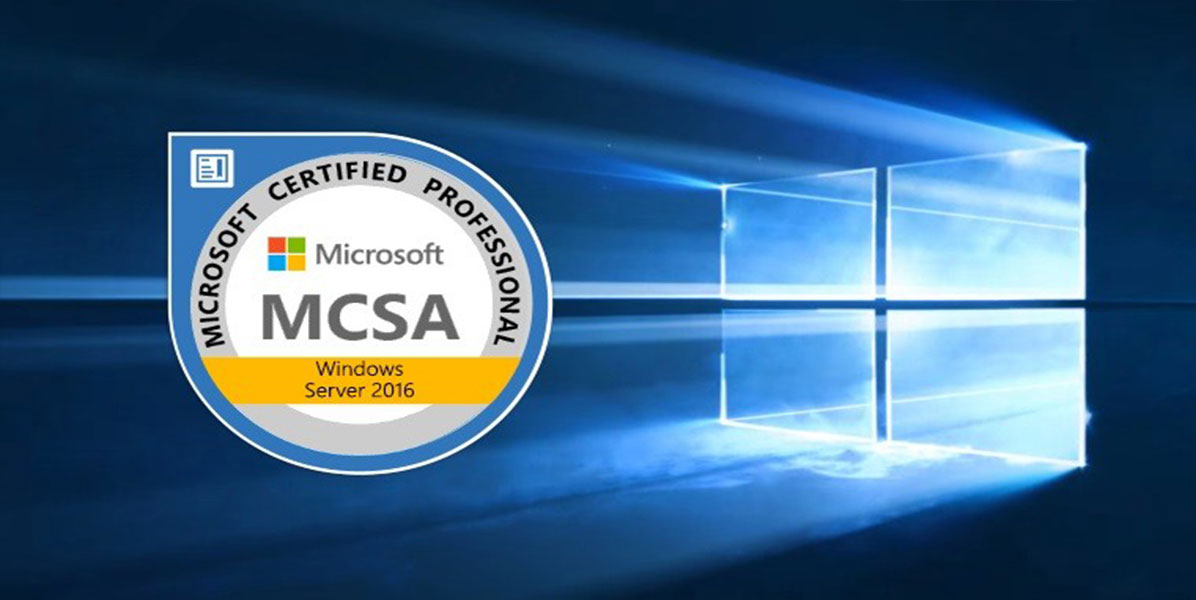MCSA Server 2016

MCSA or Microsoft Certified Solutions Associate is a career defining certification offered by the Microsoft Corporation. The MCSA certification is considered to be an information technology professional certification for various Microsoft products. Windows Server 2016 certification qualifies you for a position as a network or computer systems administrator or as a computer network specialist, and it is the first step on your path to becoming a Microsoft Certified Solutions Expert (MCSE).
Audience
STUDENTS / FRESHERS/ WORKING PROFESSIONALS
1. We will make students to obtain authorized training that will prepare them for certification and booster their employment opportunities.
2. Working System administrators can develop and upgrade the knowledge to MS Server 2016 Technologies
Prerequisites
Networking(N+)
Duration:
Total duration – 180 Hrs.
Part time - 90days, 2hours/day.
Full time - 23days, 8hrs/day
Key Benefits:
Storage Spaces and Data Deduplication, Microsoft Hyper-Manage Windows and Hyper-V containers, High availability and disaster recovery technologies in Windows Server 2016,failover cluster Domain Name System (DNS),IP address management (IPAM),remote access, Direct Access, virtual private networks (VPNs),networking for branch offices, AD DS in complex environments, AD DS sites, and configure and manage replication, Group Policy Objects (GPOs),Secure AD DS and user accounts, Implement and manage a certificate authority (CA) hierarchy with AD CS& Implement and administer AD FS.
Course Outline:
70-740: installation, storage, and compute with windows server 2016
- Installing servers
- Upgrading and migrating servers and workloads
- Installing and configuring Nano Server
- Configuring local storage
- Configuring file and share access
- Implementing enterprise storage solutions
- Planning and configuring storage technologies and components
- Implementing Storage Spaces
- Implementing Data Deduplication
- Installing and configuring Hyper-V and virtual machines
- Installing and configuring containers
- Planning and implementing a high availability and disaster recovery solution
- Implementing failover clustering
- Managing a failover cluster
- Implementing failover clustering with Windows Server 2016 Hyper-V
- Implementing Network Load Balancing
- Creating and managing deployment images
- Managing, monitoring, and maintaining virtual machine installations
- Implementing WSUS and deploying updates
- Monitoring and troubleshooting Windows Server 2016
70-741: networking with windows server 2016
- Planning and implementing an IPv4 network
- Implementing DHCP
- Implementing IPv6
- Configuring and evaluating IPv6 transition technologies
- Implementing DNS
- Planning and implementing name resolution by using DNS
- Configuring advanced DNS settings
- Implementing and managing IPAM
- Implementing IPAM
- Remote access in Windows Server 2016
- Implementing DirectAccess
- Implementing DirectAccess by using the Getting Started Wizard
- Introduction and to implemention VPN
- Configure File server resource manager
- Configure Network access prot Configure Quotas Configure the file screens
- Implementing DFS for branch offices
- Implementing BranchCache
- Configuring advanced networking features
- Implementing Software Defined Networking
- Deploying Network Controller
70-742: identity with windows server 2016
- Installing and configuring domain controllers
- Deploying and administering AD DS
- Managing objects in AD DS
- Managing AD DS objects
- Administering AD DS
- Advanced AD DS infrastructure management
- Implementing and administering AD DS sites and replication
- Implementing AD DS sites and replication Contd.
- Implementing Group Policy
- Managing user settings with Group Policy
- Securing Active Directory Domain Services
- Securing AD DS
- FSMO
- Deploying and managing AD CS
- Deploying and managing certificates
- Deploying and using certificates
- Implementing and administering AD FS
- Implementing and administering AD RMS
- Implementing AD Backup Solution
- Implementing AD DS synchronization with Microsoft Azure AD
Career Prospects:
- Server Administrator
- System Administrator
- System Engineer